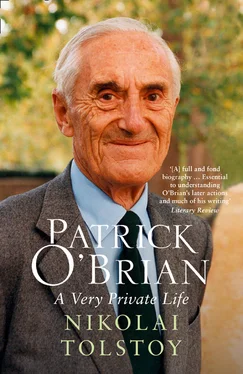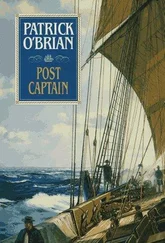My unanticipated decision to undertake the task began in the aftermath of Patrick’s death at the beginning of the year 2000. I was witness to the acute distress caused him by the imminent appearance of an unauthorized biography.[fn1] My dismay was briefly allayed by its publication soon afterwards, when I was asked to review it. My initial impression was that the book appeared largely harmless. Knowing little at the time about Patrick’s early life, and his relationship with his first wife Elizabeth and son Richard, I felt I had no reason not to accept the author’s account of Patrick’s life before I knew him as broadly accurate, and besides dismissed it as of little relevance to his reputation as a writer.
What I was not prepared for, however, was the startling extent to which a small but vociferous coterie of journalists and reviewers eagerly swallowed everything related in the book that could be interpreted as detrimental to Patrick’s reputation, regardless of its truth – or in many instances even likelihood.[fn2] Regrettably, it was in some of the more meretricious cases that his detractors arranged for their pieces to be posted on the internet for futurity.
Before long it occurred to me that I was uniquely placed to provide a more balanced and credible picture. Not only had I known Patrick intimately throughout the greater part of his life,[fn3] but in addition I possess almost all his personal papers, extending from his appearance in a pram at the age of one to his final melancholy sojourn in Dublin. This includes such invaluable sources as my mother’s and his own diaries covering every day of the greater part of the period 1945 to 1999, my mother’s financial accounts from 1945 to 1997, Patrick’s correspondence with his literary agents, publishers and admirers, manuscripts of many of his unpublished works, recorded interviews with his friends and family, extensive personal notes, preliminary drafts of his novels, his precious library, and much else. In addition, I knew intimately many of his and my mother’s friends inhabiting Collioure or visiting them there, almost all of whom are now sadly dead. However, I soon realized that, much more significantly than a desire to refute the damaging effect of media vilification, a biography based on authentic evidence would constitute a remarkable chronicle of love, endeavour, and in some ways unique triumph over daunting odds. In addition it would reveal much of the genesis and inspiration of his admired works of fiction and biography, which continue to enthral millions of readers around the world.
For the rest, it is my hope that this biography will enable readers to arrive at judgements based on evidence, rather than efflorescent imagination. In my experience, truth tends to be vastly more interesting than the most lurid of conjectures. I conclude with an assurance that I have suppressed nothing material from memories extending over five decades and the extensive archive in my possession, save one matter of trifling consequence which for the present I feel it proper to withhold.
Nikolai Tolstoy, 2019
I CONTENTS Cover Title Page PATRICK O’BRIAN A Very Private Life Nikolai Tolstoy Copyright Dedication Epigraph Preface I Collioure and Three Bear Witness II The Catalans III New Home and New Family IV Voyages of Adventure V In the Doldrums VI A Family Man VII Master and Commander VIII The Green Isle Calls IX Pablo Ruiz Picasso X Shifting Currents XI Muddied Waters XII Travails of Existence XIII Family Travails XIV The Sunlit Uplands XV Epinician Acclaims XVI Triumph and Tragedy XVII Melmoth the Wanderer Envoi Appendix A: Collioure: History and Landscape Appendix B: Patrick and His First Wife Elizabeth Appendix C: Patrick’s Sailing Footnotes Notes Index Acknowledgements About the Author Also by Nikolai Tolstoy About the Publisher
Collioure and Three Bear Witness CONTENTS Cover Title Page PATRICK O’BRIAN A Very Private Life Nikolai Tolstoy Copyright Dedication Epigraph Preface I Collioure and Three Bear Witness II The Catalans III New Home and New Family IV Voyages of Adventure V In the Doldrums VI A Family Man VII Master and Commander VIII The Green Isle Calls IX Pablo Ruiz Picasso X Shifting Currents XI Muddied Waters XII Travails of Existence XIII Family Travails XIV The Sunlit Uplands XV Epinician Acclaims XVI Triumph and Tragedy XVII Melmoth the Wanderer Envoi Appendix A: Collioure: History and Landscape Appendix B: Patrick and His First Wife Elizabeth Appendix C: Patrick’s Sailing Footnotes Notes Index Acknowledgements About the Author Also by Nikolai Tolstoy About the Publisher
I went in the loft & there found not only old account books so beautifully kept but our old formally-kept diaries of nearly 30 years ago. How vividly alive we were in those days, or seem to be in this reflection, & how v v little we lived & loved on.
Patrick’s diary, 9 December 1981
In the summer of 1945 Patrick and my mother Mary were compelled to leave London, following the abrupt termination of their wartime employment at Political Warfare Executive. Although they had been very happy during the three years’ tenancy of their elegant Queen Anne house in Chelsea, it was with buoyant excitement that they began their new life in a tiny cottage in a remote valley of North Wales. Patrick welcomed the prospect of entering on a romantic wilderness existence with my mother. His deprivation of many of the normal pleasures of childhood, above all the fellowship of contemporaries, made him by nature unusually self-sufficient. Furthermore, he and my mother were still young (Patrick being then thirty, and my mother twenty-nine), adventurous, and very much in love.
His ambitions were clear. Ever averse to dependence on others, he intended to live so far as possible by the work of his hands, while resuming his precocious career as a writer, which five years of war had compelled him to abandon. Prospects appeared as promising as might be. My mother possessed a modest private income on which they were able to scrape by in their two-roomed house at Cwm Croesor in Snowdonia, whose rent amounted to a mere £4 a year. They were fit, resourceful, and unmaterialistic: a perfect team. Neither ever baulked at hard work, and they rarely repined at the constraints of poverty. Over the bitter winter of 1945–46 they laboured undauntedly to make their home habitable, and toiled at their little garden in order to make themselves as self-sufficient as possible in the coming year. Patrick’s shooting and fishing among the mountains and lakes completed their supply of food.
Nevertheless, the spring of 1946 found him increasingly assailed by frustration and pessimism. Try as he would, his pen failed to flow with its former facility. While my mother’s faith in his talent as a writer never wavered, Patrick increasingly experienced prolonged bouts of writer’s block, a condition which by the end of their four years in Wales had all but overwhelmed him. Moving to a larger house nearby in the valley generated only the briefest spasm of revived creativity, and during the winter of 1948 –49 he began to despair of ever fulfilling his consuming ambition. He grew more and more tense, irritable, self-doubting, and agitated by agonizing thoughts of death and dissolution.[1] In addition the long dark wet winters of North Wales imposed debilitating physical gloom over their lives. Eventually he and my mother decided that their only recourse was to effect a total severance with their current unhappy existence.
After living together for six years, in the summer of 1945 Patrick had married my mother, when he further adopted the decisive course of changing his surname from Russ to O’Brian. Contrary to widespread speculation when this was belatedly made public at the end of his life, I have shown elsewhere that he did not select his new name in order to pass himself off as an Irishman. Indeed, the name itself was chosen effectively at random. His overriding motive was to achieve a total break with his past: above all, to banish all association with his selfish and frequently tyrannical father. However, as failure dogged his every effort to extract himself from the grim predicament he found himself facing, he became increasingly troubled by an obsessive fear that his father’s destructive shadow hung over him, frustrating his every effort to break free. Even the rugged recesses of Snowdonia proved too little protection from the hated oppressor, whose presence he sensed looming above him in forbidding screes or tearing down the valley in raging storms, and eventually it seemed that a second flight afforded the only avenue for escape and renewal.
Читать дальше












